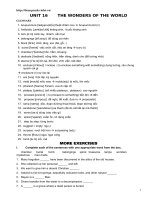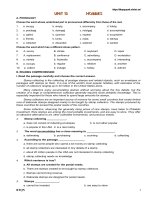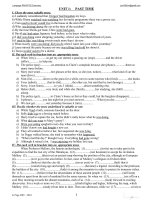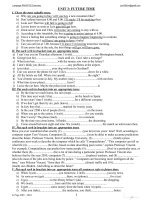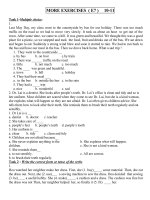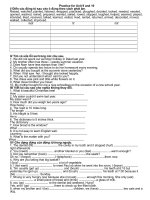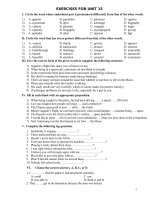- Trang chủ >>
- Mầm non >>
- Mẫu giáo nhỡ
Practice Unit 1G8
Bạn đang xem bản rút gọn của tài liệu. Xem và tải ngay bản đầy đủ của tài liệu tại đây (61.74 KB, 2 trang )
<span class='text_page_counter'>(1)</span>Name:………………………. Class: 8……. Practice : Unit 1. ( At home- P1 ). I. SUPPLY THE CORRECT FORM OF THE VERB :. 1. We can not go out now. It ( rain )…………………… heavily outside. 2. Hung often ( play) ………………………….football with his classmates in the afternoon. Now he (not play ) …………………………..football. He ( study ) …………………..his lessons at home for the History test tomorrow. 3. Now Hoa is not at home. She ( stay )……………………. with her aunt and uncle in Nha Trang. 4. We ( Have )…………………….. a holiday in Hue next month. 5. What …………..students ( often, do )…………………….at recess ? They (play )…………. lots of games together. 6. She ( not drink)..........................coffee. She ( drink).................Coca Cola. 7. It ( be)................often hot in the Summer. 8. What ...............you ( do)........................every evening? 9. The Earth ( circle) ............................the Sun once every 365 days. 10. I ( see) ..................her very often. 11. Most rivers ( flow)................................into the sea. 12. Bees ( make).........................honey. 13. Where.......................Martin (come)........................from? - He (be)....................Scottish. 14. Look ! what …………… they ( do ) ………………….. now ? 15. Nam ( go ) ………………….. to a junior high school in Ho chi Minh city. 16. Hoa ( practice ) ……………………the piano everyday. 17. …………..You ( be ) ………………free next Sunday ? 18. Columbus …………….(discover) America more than 400 years ago. 19. It …………………(rain) very hard now. 20.The sun …………….(warm) the air and ………………..(give) us light. 21.They ………………..(come) here a month ago. II. COMBINE THESE PAIRS OF SENTENCES, USING “( NOT) ENOUGH”. 1. Peter gets up early. He goes to school on time. 2. We try hard. We get good marks. 3. That engineer is talented. He can make a new machine. 4. Phuong has money. She can buy a new dictionary. 5. Her younger sister isn’t old. She can’t leave school. 6. He is tall. He can play volleyball……………………………………………………………….. 7. My sister is old. She can drive a car……………………………………………………………….. 8. She is beautiful and intelligent. She can become Miss World. _______________________________________________________ 9. Mr. Robinson isn’t rich. He can’t buy a house. _______________________________________________________ 10. The worker is clever. He can make fine things from wood. _______________________________________________________ IV. COMBINE EACH SENTENCES INTO A NEW ONE, USING “ADJ + ENOUGH + FOR + O + TO.V”:. 1.. The story is short. We can read it in one hour. _______________________________________________________.
<span class='text_page_counter'>(2)</span> 2.. The film was very good. We saw it through. _______________________________________________________. 3.. The play was very amusing. They enjoyed it. _______________________________________________________. 4.. This song is very simple. Everybody can sing it. _______________________________________________________. 5.. This book is very interesting. You should read it. _______________________________________________________. 6.. Some of the books are important. I must read them. _______________________________________________________. 7.. He was kind. Everybody liked him………………………………………………………………….. 8.. The program on TV was interesting. We followed it through. _______________________________________________________. 9.. This exercise is very easy. The pupils can finish it in five minutes. _______________________________________________________. 10. The weather is very fine. We can go out for a walk. ………………………………………………………………………………………. V. REWRITE EACH SENTENCE, BEGINNING AS SHOWN, SO THAT THE MEANING STAYS THE SAME:. 1.Ann can’t carry that suitcase because it’s too heavy. => That suitcase isn’t ………………………………………………………………………………. 2. I can’t buy this book because it’s too expensive. => This book isn’t ……………………………………………………………………………………. 3.We can’t go swimming because the weather was too cold. => The weather isn’t ………………………………………………………………………………….. 4.He is too young to go to school. => He is not…………………………………………………………………………………………… 5. Her hair is long, straight and black. => She has…………………………………………………………………………………………….. VI. CHOOSE THE CORRECT WORDS:. 1. I go to school with ( he/ him/ his) everyday. 2. I see ( her/ herself/ she/ hers) at the Union every Friday. 3. She speaks to ( we/ us/ our/ ours ) every morning. 4. John and ( she/ her/ hers ) gave the money to the boy 5. (He/ Him/ His/ ) is going to New York on vacation. 6. The dog bit ( her/ hers/ she) on the leg. 7. Mary and ( I/ me/ mine/ my) would rather go to the movies. 8. Could you lend me your ruler? ( I/ Me/My/ Mine) has just been broken. 9.This parcel is for George and ( I/ me) 10. ( I/My/ mine/ me) mother is listening to music..
<span class='text_page_counter'>(3)</span>

